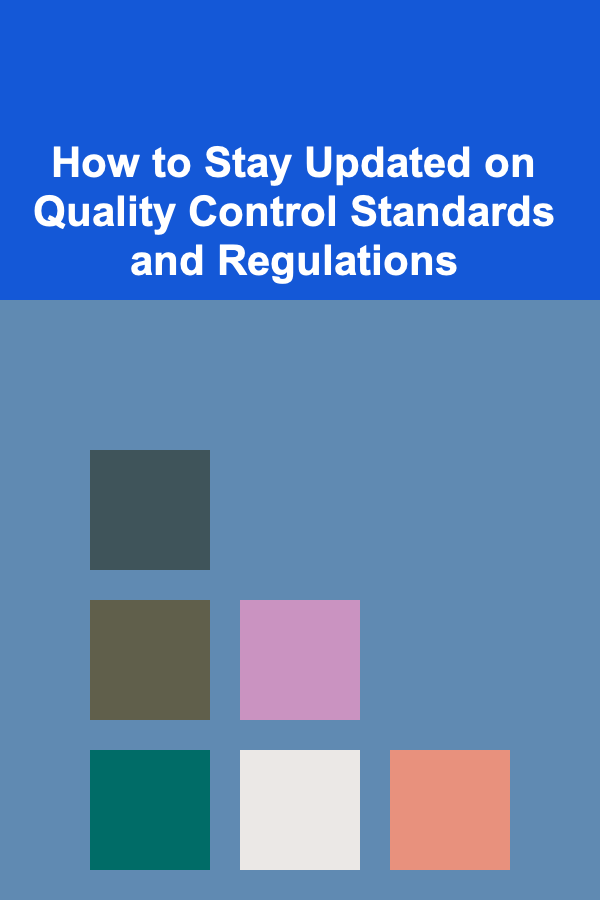
How to Stay Updated on Quality Control Standards and Regulations
ebook include PDF & Audio bundle (Micro Guide)
$12.99$6.99
Limited Time Offer! Order within the next:

In today's fast-paced and globalized business world, quality control (QC) plays a pivotal role in ensuring that products and services meet the necessary standards, regulatory requirements, and customer expectations. Given the complexity and the ever-changing landscape of quality control standards and regulations, it is crucial for professionals, especially those in industries like manufacturing, food production, pharmaceuticals, and software, to stay informed about the latest updates. Failing to comply with updated quality control standards can lead to costly errors, fines, or even product recalls, undermining a company's reputation.
This article will explore in detail the importance of staying updated on quality control standards and regulations, offer strategies and tools to help you remain informed, and delve into the methods that quality control professionals can use to ensure compliance and maintain the highest standards in their respective fields.
The Importance of Quality Control Standards and Regulations
Quality control is a systematic process designed to monitor and maintain the quality of products or services within defined parameters. The purpose of QC standards is to ensure consistency, reliability, and customer satisfaction. Regulatory standards go beyond voluntary measures, often being legally enforced by governmental or international bodies. Non-compliance with these regulations can result in reputational damage, financial penalties, or even legal ramifications.
1.1. Legal and Financial Implications
In many industries, adhering to quality control standards is not just a best practice, it's a legal requirement. For example, the pharmaceutical industry must comply with Good Manufacturing Practice (GMP) standards to ensure that drugs are produced consistently and are safe for consumption. Failure to comply with these regulations can result in lawsuits, fines, or shutdowns.
In industries like food production or automotive manufacturing, non-compliance can lead to product recalls, which are costly and damage consumer trust. Furthermore, global businesses often face multi-jurisdictional regulations, adding a layer of complexity in understanding the specific QC standards for each market.
1.2. Customer Trust and Reputation
Customer satisfaction hinges on consistent product quality. If your products or services don't meet established quality standards, consumers may choose to take their business elsewhere. A company's reputation is often built on the reliability of its products, and even one misstep in quality can undermine years of hard work.
Consumers are also becoming more discerning, and they often seek assurance that products align with sustainable, ethical, and quality-driven practices. For instance, an increasing demand for eco-friendly products and ethical sourcing means that businesses must adopt new QC standards and certifications.
1.3. Innovation and Efficiency
Staying updated on QC standards helps companies maintain a competitive edge. Many standards drive innovation and efficiency by encouraging the adoption of new technologies, processes, or methodologies. By staying on top of the latest regulations, organizations can ensure they are implementing the best practices, which can lead to improved productivity, reduced waste, and overall operational efficiency.
Key Quality Control Standards and Regulations
The landscape of quality control is vast and multi-faceted, as standards vary widely depending on industry, location, and product type. Let's explore some key regulations and standards that govern various sectors:
2.1. International Organization for Standardization (ISO)
The ISO is an independent, non-governmental international organization that develops and publishes standards. Among the most widely recognized quality control standards are the ISO 9000 series, which focuses on quality management systems, and ISO 14000 series, which deals with environmental management.
- ISO 9001: Focuses on quality management systems (QMS) and ensures that companies meet customer expectations and regulatory requirements.
- ISO 13485: A specialized standard for medical devices and related services, ensuring that products meet regulatory standards.
- ISO 22000: A food safety management system that ensures safe food handling practices from farm to fork.
2.2. Good Manufacturing Practice (GMP)
Good Manufacturing Practice (GMP) regulations are enforceable standards that ensure products are consistently produced and controlled according to quality standards. These regulations apply to various industries such as pharmaceuticals, cosmetics, and food products. GMP covers all aspects of production, from raw materials and equipment to hygiene practices and employee training.
2.3. International Conference on Harmonization (ICH)
The ICH sets international standards for the pharmaceutical industry, ensuring that products are safe, effective, and of high quality. The ICH guidelines focus on key areas such as product development, clinical trials, and regulatory compliance, helping companies adhere to best practices across borders.
2.4. Food and Drug Administration (FDA) Regulations
The FDA is responsible for protecting public health in the United States by ensuring the safety of food, drugs, cosmetics, and medical devices. FDA regulations, such as 21 CFR Part 820 (Quality System Regulations for medical devices) and 21 CFR Part 110 (Current Good Manufacturing Practice for food), govern the manufacturing processes and quality control procedures of products in these sectors.
2.5. Automotive Industry Standards (IATF 16949)
The International Automotive Task Force (IATF) 16949 is a global standard specifically for the automotive industry, focusing on the development of quality management systems. It is based on ISO 9001 and incorporates additional requirements relevant to automotive manufacturers and suppliers.
2.6. Occupational Safety and Health Administration (OSHA) Standards
OSHA sets standards related to workplace health and safety, impacting the way companies approach quality control with respect to employee safety. Compliance with these standards is critical, especially in manufacturing, construction, and healthcare industries.
Methods to Stay Updated on QC Standards and Regulations
With constantly evolving regulations, it's crucial to adopt proactive strategies for staying informed about changes in quality control standards. Here are several methods to ensure you remain updated:
3.1. Subscribe to Industry Publications and Journals
Industry publications and peer-reviewed journals are excellent sources of the latest updates on quality control regulations. Many fields, such as pharmaceuticals, food production, and manufacturing, have specialized journals that feature articles, case studies, and legal updates on QC standards.
- Examples: The Journal of Quality Technology, International Journal of Quality & Reliability Management, or industry-specific publications like Pharmaceutical Technology.
3.2. Attend Conferences and Workshops
Industry conferences and workshops are great opportunities to learn about new regulations, network with experts, and gain insights from leading professionals in the field. Many regulatory bodies and industry groups hold annual conferences where updates on regulations are presented, and workshops provide hands-on training in new standards and techniques.
- Examples: The American Society for Quality (ASQ) holds annual conferences, as do the ISO and ICH, which offer both in-person and virtual events.
3.3. Use Regulatory Monitoring Tools and Subscriptions
Several companies and services offer regulatory monitoring tools that automatically notify you when there are changes in relevant regulations. These tools aggregate updates from multiple sources, making it easier to track changes across different regulatory bodies.
- Examples: LexisNexis Regulatory Compliance, Regulatory Affairs Professionals Society (RAPS), and SAI Global.
3.4. Follow Regulatory Bodies and Standards Organizations
Keeping an eye on the websites and publications of relevant regulatory bodies is one of the most direct ways to stay updated. Many regulatory agencies offer newsletters, bulletins, and press releases on new or revised regulations. Additionally, social media channels, webinars, and email lists from these organizations provide timely updates.
- Examples: Follow ISO, the FDA, or your local regulatory body on social media platforms or subscribe to their email alerts.
3.5. Collaborate with Consultants and Industry Experts
Hiring external consultants or working with regulatory experts can be a valuable resource for understanding complex or industry-specific QC regulations. Consultants can provide tailored advice on how to implement the latest regulations and help your company achieve and maintain compliance.
3.6. Training and Certification Programs
Regularly enrolling in training programs or certification courses is an effective way to stay informed about new regulations. Many certification bodies, including ISO, provide training courses on various standards. These programs are updated frequently to reflect the latest regulations.
- Examples: The ASQ offers certification in quality control, and ISO offers courses for their various management systems.
Best Practices for Maintaining QC Standards
Once you have successfully stayed updated on the latest quality control standards and regulations, the next challenge is to ensure they are consistently maintained throughout your organization. Here are some best practices for implementing and maintaining these standards effectively:
4.1. Develop a Comprehensive QC Manual
A well-structured quality control manual serves as the cornerstone for ensuring compliance with QC standards. The manual should outline the policies, procedures, and specific regulatory standards that your organization must adhere to. This document should be regularly updated to reflect any changes in regulations.
4.2. Conduct Regular Audits and Inspections
Conducting internal audits and quality inspections is essential for verifying compliance with the latest standards. Regular audits help identify potential gaps in quality control processes and provide a roadmap for corrective actions.
4.3. Invest in Quality Management Systems (QMS)
Implementing a robust QMS software can automate and streamline the process of tracking, documenting, and ensuring compliance with quality control standards. QMS tools help monitor workflows, traceability, and non-conformances, and they integrate with regulatory updates to ensure your processes stay compliant.
4.4. Encourage a Culture of Continuous Improvement
Creating a culture of continuous improvement within your organization ensures that quality control is a constant priority. Encourage employees to provide feedback and suggest improvements to processes, products, and services.
Conclusion
Quality control standards and regulations are an essential aspect of maintaining product integrity, customer satisfaction, and legal compliance. Staying updated on these standards is a continuous process that requires ongoing effort, attention, and a proactive approach. By using a combination of tools, staying engaged with industry developments, and adhering to best practices, professionals can ensure their organizations remain compliant and uphold the highest quality standards. Staying informed not only minimizes risks but also fosters innovation, ensuring long-term business success and consumer trust.
Reading More From Our Other Websites
- [Personal Investment 101] How to Invest in Startups: A Beginner's Guide to Early-Stage Ventures
- [Home Space Saving 101] How to Transform Your Small Entryway into a Functional and Stylish Space
- [Home Maintenance 101] How to Ensure Electrical Wiring Safety in Your Older Home: A Step-by-Step Guide
- [Home Budget Decorating 101] Best Farmhouse Budget Decorating: Rustic Charm on a Realistic Home Budget
- [Home Renovating 101] How to Transform Your Bedroom on a Budget: Creative Makeover Ideas
- [Home Budget 101] How to Plan for Home Repairs and Unexpected Expenses
- [Trail Running Tip 101] From City Streets to Forest Paths: Transitioning to Trail Running Safely
- [Organization Tip 101] How to Use Bins and Baskets for Trunk Organization
- [Rock Climbing Tip 101] Strength, Flexibility, and Endurance: How Climbing Transforms Your Body
- [Tiny Home Living Tip 101] Best Tiny Home Lighting Ideas to Enhance Small Spaces

How to Plan a Sustainable Conference: A Checklist for Eco-friendly Events
Read More
How to Sell Homemade Products Online and Earn Extra Income
Read More
How to Store Lawn Care Equipment Effectively
Read More
How to Tackle Tough Carpet Stains with Household Items
Read More
How to Use Colorful Stockings to Decorate Your Home for the Holidays
Read More
How to Craft an Auto Body Repair Appointment To-Do List: Insurance & Estimates
Read MoreOther Products

How to Plan a Sustainable Conference: A Checklist for Eco-friendly Events
Read More
How to Sell Homemade Products Online and Earn Extra Income
Read More
How to Store Lawn Care Equipment Effectively
Read More
How to Tackle Tough Carpet Stains with Household Items
Read More
How to Use Colorful Stockings to Decorate Your Home for the Holidays
Read More